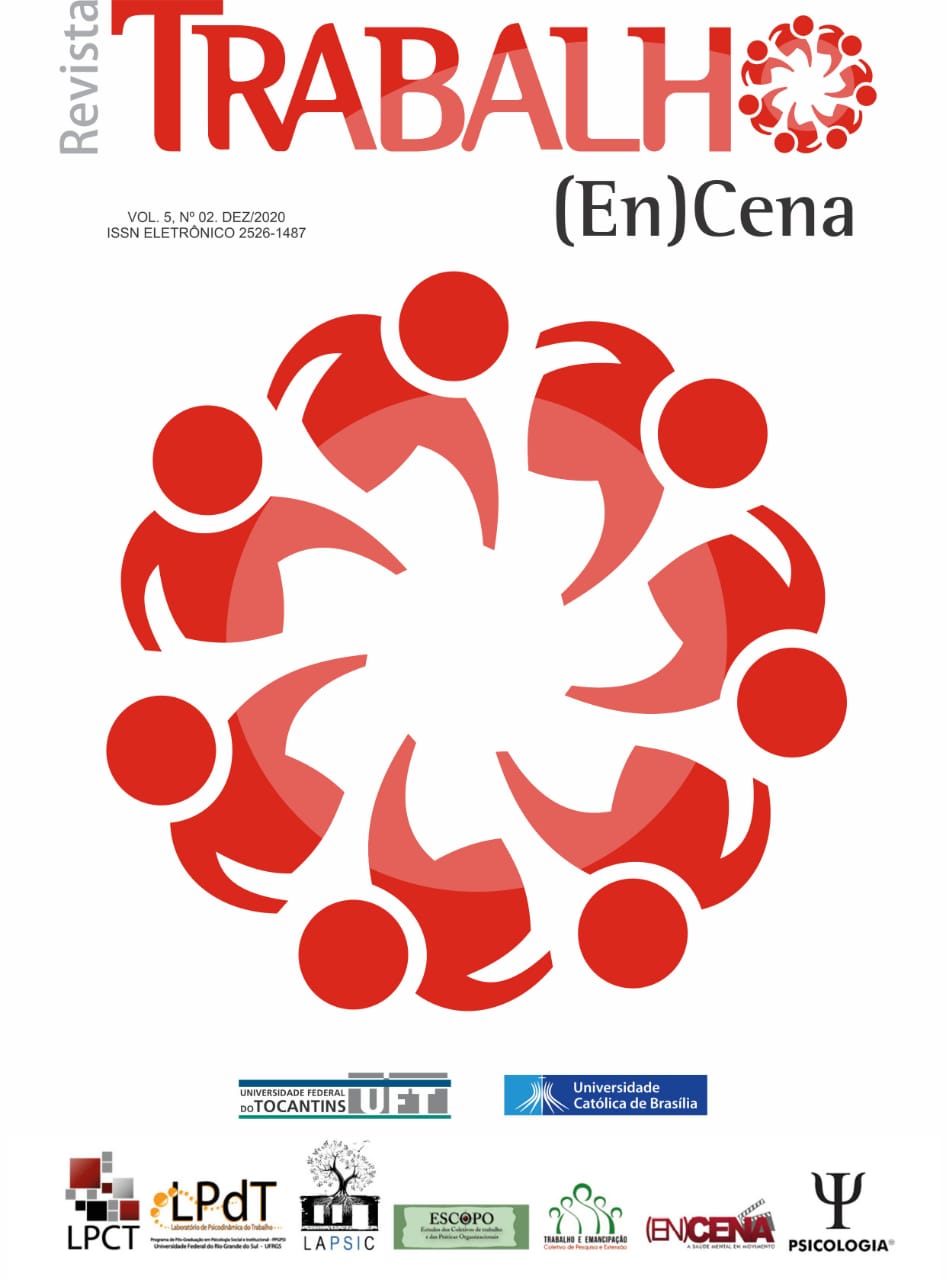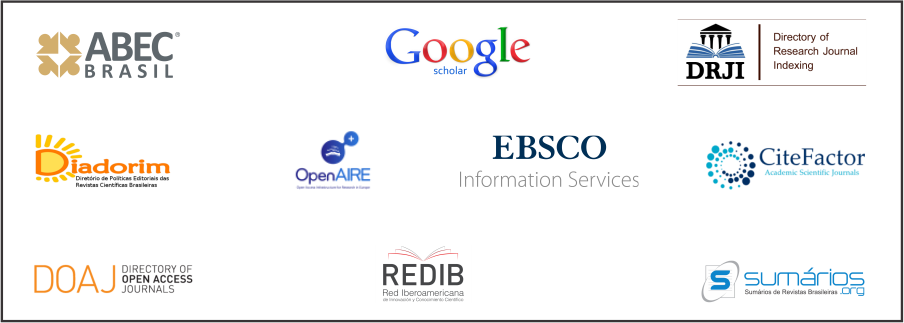ANÁLISE PSICOMÉTRICA DE DUAS ESCALAS DE MEDIDA ASSOCIADAS À PROFISSÃO DOCENTE
DOI:
https://doi.org/10.20873/2526-1487V5N2e020006Palavras-chave:
Engajamento no trabalho, satisfação no trabalho, Autoeficácia profissional, análise de RaschResumo
O presente estudo visa analisar duas escalas de medida associadas ao engajamento no trabalho de professores quebequenses em início de carreira – a satisfação no trabalho e a autoeficácia profissional, bem como examinar as propriedades psicométricas do instrumento utilizado. Análises de Rasch foram desenvolvidas para estudar as duas referidas escalas, assim como o efeito do gênero e do nível de ensino nas variáveis em análise, utilizando amostra de 184 novos professores. As escalas em estudo apresentam unidimensionalidade e independência local, resultados que indicam bom ajustamento dos dados aos dois modelos. No entanto, uma maior quantidade de itens é necessária para melhor estimar a localização das pessoas nas escalas de medida, sobretudo no que tange à autoeficácia profissional.
Referências
Andrich, D. & Hagquist, C. (2004). Detection of Differential Item Functioning Using Analysis of Variance. Apresentada na 2nd International Conference on Measurement in Health, Education, Psychology and Marketing: Developments with Rasch Models, Murdoch University, Perth, Australia.
Andrich, D., Sheridan, B. & Luo, G. (2008). Rasch Unidimensional Measurement Model [Computer software]. Perth : RUMM Laboratory, 2030.
Andrich, D.; Humphry, SM. & Marais, I. (2012). Quantifying local, response dependence between two polytomous items using the Rasch model. Applied Psychology Measurement, 36, 309–324.
Bandura, A. (1997). Self-Efficacy : The Exercice of Control. New York : Freeman.
Bennet, P. (2010). Self-efficacy and Perceptions of Community: How They Relate to New Teachers' Commitment. Thèse de doctorat inédite, University of Virginia, Virginia, United States.
Bond, T. G. & Fox, C. M. (2007). Applying the Rasch model. Fundamental measurement in the Human sciences (2 ed). New York: Routledge.
Caldas, C. B., Somensari, P., Costa, S. N., Siqueira, M. M. M. & Claro, A. C. S. (2013). Satisfação e engajamento no trabalho: docentes temáticos e auxiliares da EAD de universidade privada brasileira. Gerais: Revista Interinstitucional de Psicologia, 6(2), 225-237.
Canrinus, E. T., Beijaard, D., Buitinik, J. & Hofman, A. (2012). Self-identity, job satisfaction, motivation and commitment : Exploring the relationship between indicators of teachers' professional identity. European Journal of Psychology of Education, 27(1), 115-132.
Chan, W.-Y., Lau, S., Nie, Y., Lim, S. & Hogan, D. (2008). Organizational and personal predictors of teacher commitment : the mediating role of teacher efficacy and identification with school. American Educational Research Journal, 45(3), 597-630.
Chong, S. & Low, E.-L. (2009). Why I want to teach and how I feel about teaching - formation of teacher identity from pre-service to the beginning teacher phase. Educational Research for Policy and Practice, 8, 59-72.
Duchesne, C., Savoie-Zajc, L. & St-Germain, M. (2005). La raison d'être de l'engagement professionnel chez des enseignants du primaire selon une perspective existentielle. Revue des sciences de l'éducation, 31(3), 497-518.
Engelhard, G. & Wind, S. (2018). Invariant measurement with raters and rating scales: Rasch models for rater-mediated assessments. New York, NY: Routledge.
Huang, S-Y L. & Waxman, H. C. (2009). The association of school environment to student teachers’ satisfaction and teaching commitment. Teaching and Teacher Education, 25, 235-243.
Ingersoll, R. M. & Smith, T. M. (2004). Do teacher induction and mentoring matter? NASSP Bulletin, 88(638), 28-40.
Kamanzi, P. C., Lessard, C., Riopel, M.-C., Blais, J.-G., Larose, F., Wright, A. & Bourque, J. (2008). Les enseignants et les enseignantes au Canada: contexte, profil et travail. Enquêtes pancanadiennes auprès des directions et des enseignants d'écoles primaires et secondaires au Canada (2006). Montréal : Université de Montréal.
Karsenti, T. & Collin, S. (2009). L'autre décrochage scolaire. Formation et profession, mars, 2-6.
Klassen, R. M. & Chiu, M. M. (2010). The occupational commitment and intention to quit of practicing and pre-service teachers: Influence of self-efficacy, job stress, and teaching context. Contemporary Educational Psychology, 36, 114-129.
Lent, R. W. & Brown, S. D. (2006). Integrating person and situation perspectives on work satisfaction : A social-cognitive view. Journal of Vocational Behavior, 69(2), 236-247.
Létourneau, E. (2014). Démographie et insertion professionnelle : une étude sur le personnel enseignant des commissions scolaires du Québec. Repéré à http://www.ciqss.umontreal.ca/Docs/Colloques/2014_ACFAS/Esther%20L%C3%A9tourneau.pdf
Lison, C. & De Ketele, J-M. (2007). De la satisfaction au moral professionnel des enseignants: étude de quelques déterminants. Revue des Sciences de l’Éducation, 33(1), 179-207.
Maroy, C. (2006). Les évolutions du travail enseignants en France et en Europe : facteurs de changement, incidences et résistances dans l'enseignement secondaire. Revue française de pédagogie, 155, 111-142.
Martin, A. J. & Dowson, M. (2009). Interpersonal relationships, motivation, engagement, and achievement : Yields for theory, current issues, and educational practice. Review of Educational Research, 79(1), 327-365.
Mukamurera, J. (2014). Le développement professionnel et la persévérance en enseignement : éclairage théorique et étas des lieux. In : S. Martineau, L. Portelance & J. Mukamurera (Ed.), Constats et perspectives pour soutenir le développement et la persévérance professionnels en enseignement., Développement et persévérance professionnels en enseignement. Oui mais comment?. (pp. 9-34). Québec : PUQ.
Ng, T. W. H., Eby, L. T., Sorensen, K. L. & Feldman, D. C. (2006). Predictors of objective and subjective career success : a meta-analysis. Personnel Psychology, 58(2), 367-408.
Organisation de Coopération et Développement Économiques - OCDE. (2005). Le rôle crucial des enseignants : attiver, former et retenir des enseignants de qualité. Paris : OCDE, Direction de l'éducation.
Pallant, J. F., Misajon, R. A., Bennett, E. & Manderson, L. (2006). Measuring the impact and distress of health problems from the individual's perspective : Development of the Perceived Impact of Problem Profile (PIPP). Health and Quality of Life Outcomes, 4(36), 1-13.
Parker, P. D., Martin, A. J., Colmar, S. & Liem, G. A. (2012). Teachers' workplace well-being : Exploring a process model of goal orientation, coping behavior, engagement, and burnout. Teaching and Teacher Education, 28, 503-513.
Penta, M., Arnould, C. & Decruynaere, C. (2005). Développer et interpreter une échelle de mesure. Belgique : Mardaga.
Ramp, M., Khan, F., Misajon, R. A. & Pallant, J. F. (2009). Rasch analysis of the Multiple Sclerosis Impact Scale (MSIS-29). Health and Quality of Life Outcomes, 7(58), 1-10.
Rey, J. & Coen, P-F. (2012). Évolution des attitudes motivationnelles des enseignants pour l’intégration des technologies de l’information et de la communication. Formation et Profession, 20(2), 19-32.
Skaalvik, E. M. & Skaalvik, S. (2014). Teacher self-efficacy and perceived autonomy: relations with teacher engagement, job satisfaction, and emotion exhaustion. Psychological Reports, 114 (1), 68-77.
Tabachnick, B. G. & Fidell, L. S. (2012). Using multivariate statistics (6ª ed.). Boston: Allyn and Bacon.
Downloads
Publicado
Como Citar
Edição
Seção
Licença
Os direitos autorais dos artigos publicados pela Revista Trabalho EnCena permanecem propriedade dos autores, que cedem o direito de primeira publicação à revista. Os autores devem reconhecer a revista em publicações posteriores do manuscrito. O conteúdo da Revista Trabalho EnCena está sob a Licença Creative Commons de publicação em Acesso Aberto. É de responsabilidade dos autores não ter a duplicação de publicação ou tradução de artigo já publicado em outro periódico ou como capítulo de livro. A Revista Trabalho EnCena não aceita submissões que estejam tramitando em outra Revista. A Revista Trabalho EnCena exige contribuições significativas na concepção e/ou desenvolvimento da pesquisa e/ou redação do manuscrito e obrigatoriamente na revisão e aprovação da versão final. Independente da contribuição, todos os autores são igualmente responsáveis pelo artigo.






